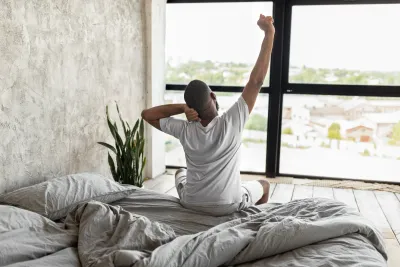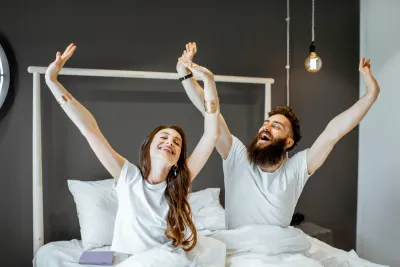How to Wake Up Naturally: Tips to Rise Without an Alarm Clock
Chilipad Editorial Team • Apr 28, 2025

Key Takeaways
Your body already knows how to wake up—your habits just need to get out of the way.
- You can train your internal clock to wake you naturally, reducing reliance on loud, jarring alarm clocks.
- Consistent sleep and wake times—yes, even on weekends—teach your brain when it’s time to rise.
- Morning light exposure helps lock in your wake-up time and boosts alertness early in the day.
- A dark, cool, and quiet bedroom supports deeper sleep, making natural wake-ups easier and less groggy.
- Nighttime habits matter—cutting back on late-night screens, heavy meals, and caffeine leads to smoother mornings.
Your body runs on a built-in sleep-wake cycle that’s shaped by light, daily habits, and even what you eat. When an alarm cuts through that rhythm—especially during Deep or REM sleep—it can yank you awake and leave you groggy, no matter how many hours you logged.
But when you sync your wake-up time with your body’s own signals, mornings feel sharper, fresher, and a lot less dependent on that blaring alarm.
Understanding Your Body's Natural Rhythms
Your body runs on an internal body clock called the circadian rhythm—a 24-hour cycle that controls when you feel tired or alert. Bright ight plays a big role here: as the sun sets, your system starts winding down, and by morning, it’s gearing you up to wake naturally.
When that rhythm gets thrown off—say, by an all-nighter or too much late-night screen time—you pay for it with grogginess and restless sleep. Respecting this built-in cycle doesn’t just help you sleep better, it keeps your energy and overall sleep health on track.
Did You Know: Waking up without an alarm can combat morning grogginess, improve mood, and reduce daytime drowsiness.
Learn how to train your body’s circadian rhythm so you can wake up naturally without an alarm clock, feel refreshed, and reduce morning grogginess.
Your body and mind will thank you!
Naturally Wake Up with the Dock Pro
Experience a natural awakening with the Chilipad Dock Pro. Its warm awake feature gently warms your bed, easing you into your day.
How a Warm-Awake Alarm Helps You Wake Up Naturally
Are you tired of that awful alarm clock jolt? The Chilipad Dock Pro has a "Warm-Awake" alarm mode that's way better. Instead of a sudden noise, it’s like a bed alarm. It gently warms your bed over 20 minutes, starting 15 minutes before your set wake-up time.
It's like the sun rising, gradually telling your body it's time to wake up. This comfortable and natural transition means no more jarring wake-up calls, and you rise feeling happy and ready to go!
What’s the best time to wake up naturally? Aim to wake up within 15 minutes of your target time every day to strengthen your internal rhythm and reduce grogginess.

What Dawn Simulation Is and Why It Works for Natural Wake-Ups
Dawn simulators are a clever way to wake up feeling refreshed. They work by gradually increasing light over 15 to 45 minutes before your alarm time, mimicking a sunrise. This gentle light helps regulate your body's natural sleep-wake cycle, making for a less disruptive and more natural awakening.
Morning light exposure from dawn simulators regulates your circadian rhythm and promotes alertness. This gradual light makes waking up naturally and so much easier.
Related: Sleep disorders can throw your nights off balance. If you have any concerns, read our blog on common sleep disorders, their symptoms, and treatments to learn more.
How Morning Light Signals Your Body Clock to Wake Up
Light strongly influences your circadian rhythm. Exposure to morning light improves daytime alertness and helps you sleep better at night.
Catching some sunlight in the morning is like hitting the reset button. It helps you feel sleepy at the right time later and makes drifting off at night easier.
Try to get outside within the first hour after waking—your circadian rhythm will thank you. Plus, it’s a simple way to set a good tone for the rest of your day.
Does Morning Exercise Help You Wake Up Naturally?
It's often easier said than done, but regular morning exercise is one of the best things you can do for your sleep and your natural wake-up routine. Physical activity, particularly in the morning, can help you fall asleep faster and sleep more deeply.
And the more consistent you are, the easier it will become to wake up without an alarm.
Morning workouts, especially outdoors, are particularly beneficial because the sunlight helps regulate your circadian rhythm (your body's clock).
A recent study even found that 65% of Americans prefer morning workouts, with 33% of men and 21% of women favoring the 6 a.m. to 8 a.m. window. [1]
Energize your day with a morning workout. It's a great way to boost your health and your mood.

Best Sleep Environment Tips for Natural Wake-Ups
Your sleep quality depends significantly on the environment you create. For the best sleep, aim for a bedroom temperature between 60 and 67 degrees Fahrenheit.
A cooler room helps your body temperature decrease, which is important for falling asleep. A bedroom that is too hot can disrupt can cause havoc on falling asleep, duration, and the quality of sleep.
If you're having trouble falling asleep, darkness matters just as much as light. Too much brightness at night shuts down melatonin production, making it harder to drift off and stay asleep. Blackout curtains can help keep things dark, while cutting down on noise supports deeper, uninterrupted rest.
Comfort is the other piece of the puzzle. The right mattress and pillows make a big difference, and keeping cool is key for solid sleep. That’s where the Chilipad Dock Pro comes in, the best cooling mattress topper that lets you dial in your ideal sleep temperature. With personalized climate control, you get comfort that sticks all night long.
How a Consistent Sleep Schedule Trains Your Body Clock
Sticking to a regular sleep schedule is one of the simplest ways to wake up feeling rested and full of energy. When you go to bed and wake up at the same time every day, you strengthen your body’s internal clock, making it easier to fall asleep at night and wake up easier in the morning.
Technology can actually help you stay on track. Try setting gentle reminders or alarms on your phone or smartwatch for both bedtime and wake-up time. These little nudges make it easier to stick to your routine, even on busy days.
Aim to follow your schedule as closely as possible—even on weekends. The more consistent you are, the more your body will naturally start to feel tired at night and refreshed when you wake up.
Once your body adjusts, you’ll notice real changes: mornings won’t feel as groggy, energy will last longer throughout the day, and sleep will feel more restorative. Over time, this steady rhythm helps you feel more balanced, focused, and ready to take on whatever comes your way.
Relaxation Techniques That Improve Sleep Quality
Relaxation techniques can be powerful tools to help you fall asleep more easily and enjoy deeper rest. One of the simplest yet most effective methods is diaphragmatic breathing, which focuses on slow, deep breaths that fill your belly. [2]
This type of breathing helps calm your nervous system and melt away stress.
Visualization exercises, like body scans, guide you gently through releasing tension from head to toe, creating a peaceful, relaxed state. Another helpful practice is progressive muscle relaxation, where you systematically tighten and then relax different muscle groups, easing physical stress and preparing your body for restful sleep.
For those wanting to go deeper, Yoga Nidra for sleep is a fantastic pre-bedtime practice that encourages profound relaxation without actually falling asleep. Similarly, non-sleep deep rest techniques provide calm and stress relief, helping your mind and body unwind.
Adding any of these practices to your bedtime routine can create a soothing ritual that quiets your mind, lowers stress, and sets the stage for a better night’s sleep.

Alarm Clocks and Sleep Quality
Alarm clocks, though necessary for many, can negatively impact sleep quality. A loud alarm can wake you up suddenly. It often starts your day with a rush of stress. An abrupt wake-up call triggers the release of stress hormones. This makes mornings feel hectic and unpleasant.
Being mindful of these effects helps you choose alarm clocks that wake you more gently or consider alternatives like dawn simulators or the Chilipad Dock Pro, and its warm-wake feature, similar to a bed alarm. They can help you get up without the alarm.
Final Thought
Waking up naturally isn’t just a nice way to start the day—it’s a powerful step toward better sleep, brighter moods, and more energy. By tuning into your body’s rhythms and using simple strategies like keeping a consistent sleep schedule, getting morning sunlight, and creating a cozy sleep space, you can transform how you feel from the moment you open your eyes.
Small changes, like skipping the snooze button, can make a big difference in waking up refreshed. Try out these tips, find what fits your life best, and enjoy the feeling of truly rested mornings that set you up to embrace the day ahead.
Frequently Asked Questions: Wake Up Naturally
How long does it take to wake up naturally without an alarm?
Most people need 1–3 weeks of a consistent sleep schedule for their internal clock to adapt. The more regular your bedtime and wake time, the faster your body learns to wake on its own.
Can Technology Help Me Get Up Naturally?
Absolutely! Smart lights that mimic sunrise, sleep trackers, and gentle vibration alarms are clever ways to sync your body clock without the jarring buzz. The Chilipad Dock Pro even unlocks Warm Awake—a feature that gently warms your bed to help you rise naturally and feel refreshed, no blaring alarm needed.
What mistakes prevent people from waking up naturally?
The biggest blockers are inconsistent bedtimes, late-night light exposure, caffeine or alcohol too close to bed, and relying on alarms that disrupt the body’s natural sleep cycle.
Can waking up without an alarm improve sleep quality?
Yes. Waking naturally often means you’re emerging from lighter sleep stages, which can reduce grogginess and support more restorative sleep overall.
What Are the Best Alarm Clocks for Heavy Sleepers?
- Chilipad Dock Pro with Warm Awake
- Sonic Bomb Alarm Clock
- Philips SmartSleep Wake-Up Light
- Loftie Alarm Clock
- Pavlok Shock Clock
Peer-Reviewed Research References
-
Arciero, P. J., et al.
Morning Exercise Reduces Abdominal Fat and Blood Pressure in Women; Evening Exercise Increases Muscular Performance in Women and Lowers Blood Pressure in Men.
Frontiers in Physiology, 2022.
Study Type: Randomized Controlled Trial
Key Finding: Exercise timing influences health outcomes, with morning workouts linked to reductions in abdominal fat and blood pressure in women, while evening exercise improved muscular performance in women and lowered blood pressure in men.
View Study
Source URL: https://pmc.ncbi.nlm.nih.gov/articles/PMC9194552/
-
Harvard Health Publishing.
Learning Diaphragmatic Breathing.
Harvard Health, March 10, 2016.
Study Type: Medical Education Resource
Key Finding: Diaphragmatic breathing activates the parasympathetic nervous system, helping reduce stress, lower heart rate, and support relaxation, which may improve sleep readiness and overall well-being.
View Resource
Source URL: https://www.health.harvard.edu/healthbeat/learning-diaphragmatic-breathing









